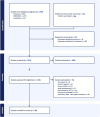Chemical adherence testing in the clinical management of hypertension: a scoping review
- PMID: 39568584
- PMCID: PMC11576289
- DOI: 10.3389/fphar.2024.1452464
Chemical adherence testing in the clinical management of hypertension: a scoping review
Abstract
Background: Despite growing use, questions remain surrounding the utility, acceptability and feasibility of chemical adherence testing (CAT) as part of hypertension management in clinical practice.
Objectives: This scoping review aimed to (i) identify and summarise studies using CAT in hypertension management, and (ii) describe and critically evaluate how CAT is currently being used in the clinical management of hypertension.
Eligibility criteria: Peer-reviewed and published studies in English, reporting original research in any setting, with any study design, were included. Search concepts included hypertension, medication adherence, CAT, and their synonyms.
Sources of evidence: Searches were carried out using Ovid Medline, EMBASE, and PsycInfo (EBSCO), alongside manual searching of reference lists. Using Covidence software, we screened titles and abstracts, followed by full-text articles. Data from the included articles were tabulated and summarised.
Results: Of the 618 studies identified, 48 were included. The studies cover diverse clinical settings, and were mostly observational in design. 7 studies reporting adherence analyses within clinical trials for hypertension therapies. The use of theoretical frameworks to guide reporting was rare, and there was considerable variation in key terminology and definitions, most notably in the definition of adherence.
Conclusion: The current body of evidence demonstrates considerable variability in the approach to implementing CAT for hypertension management in clinical practice, and a paucity of randomised controlled trials to evaluate its impact. Future research could (i) adopt a cohesive theoretical framework including clear operational definitions to standardise the approach to this important topic; (ii) further explore the impact of CAT on clinical outcomes using RCTs.
Keywords: adherence-compliance-persistance; antihypertensive; blood pressure; chemical adherence testing; hypertension; mass spectrometry.
Copyright © 2024 Rabbitt, Curneen, Dennedy and Molloy.
Conflict of interest statement
The authors declare that the research was conducted in the absence of any commercial or financial relationships that could be construed as a potential conflict of interest.
Figures
References
-
- Arksey H., O’Malley L. (2005). Scoping studies: towards a methodological framework. Int. J. Soc. Res. Methodol. Theory Pract. 8 (1), 19–32. 10.1080/1364557032000119616 - DOI
-
- Avataneo V., De Nicolo A., Rabbia F., Perlo E., Burrello J., Berra E., et al. (2018). Therapeutic drug monitoring-guided definition of adherence profiles in resistant hypertension and identification of predictors of poor adherence. Br. J. Clin. Pharmacol. 84 (11 PG-2535–2543), 2535–2543. 10.1111/bcp.13706 - DOI - PMC - PubMed
-
- Azizi M., Ménard J., Peyrard S., Lièvre M., Marre M., Chatellier G. (2006). Assessment of patients' and physicians' compliance to an ACE inhibitor treatment based on urinary N-acetyl ser-asp-lys-pro determination in the noninsulin-dependent diabetes, hypertension, microalbuminuria, proteinuria, cardiovascular events, and ramipril (DIABHYCAR) study. Diabetes Care. 29 (6), 1331–1336. 10.2337/dc06-0255 - DOI - PubMed
-
- Beaussier H., Boutouyrie P., Bobrie G., Frank M., Laurent S., Coudoré F., et al. (2015). True antihypertensive efficacy of sequential nephron blockade in patients with resistant hypertension and confirmedmedication adherence. J. Hypertens. 33 (12), 2526–2533. 10.1097/HJH.0000000000000737 - DOI - PubMed
Publication types
LinkOut - more resources
Full Text Sources
Research Materials
Miscellaneous



